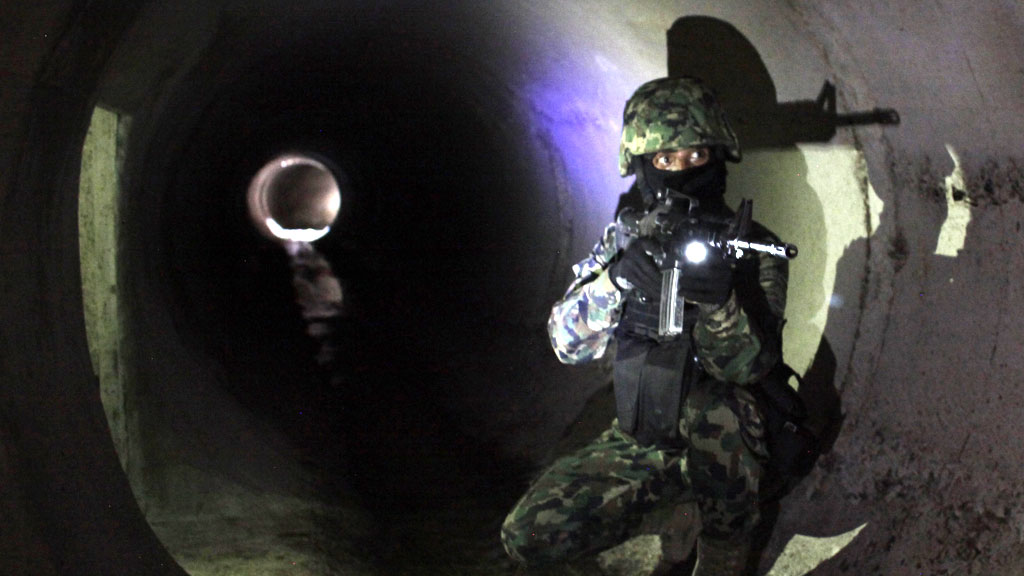Why death of Mexican drugs kingpin will not quell violence
A top cartel leader killed, another kingpin captured. On the face of things, it’s been a good few weeks for Mexico’s President Enrique Peña Nieto, writes Thom Walker.

The death on Sunday of Nazario Moreno González – one of the leaders of the ruthless Knights Templar – is unlikely to do much to quell the violence that has ravaged Mexico since 2006.
After little more than a year in office, Peña Nieto’s government can boast some successes: in 2013 murder rates declined by 22 per cent, according to official figures.
This, while his government invested over $9bn into more than 200 of the most violent neighbourhoods across the country, offering better jobs, schooling and cultural activities in an effort to stem youth recruitment by the cartels.
There is so much violence, and we have no idea where it’s coming from. Juana Peréz Avilés
Further statistics tell a more complex story: kidnapping increased by more than 30 percent to over 100,000 last year. A little over one percent of them were reported, as extortion skyrocketed.
In Mexico, many say Peña Nieto’s only real success has been to keep violence off the front pages, except when parading his triumphs.
Indeed, last month’s capture of the Sinaloa cartel’s near mythical figurehead, Joaquín “El Chapo” Guzmán, heralded headlines that the president surely relished.
Self-defence groups
On the ground, however, as I learned when reporting on the Knights Templar for Channel 4 News, such “victories” mean little to those who live in the towns and villages across the state of Michoacán, the cartel’s stronghold.
The emergence of armed “self-defence” groups in 2013 was testament to the failure of local authorities to bring violence under control. One of their leaders, the ebullient Hipólito Mora, took us out on a security patrol in one town.
He made it clear that they would not disarm until the government could secure the state and drive out the cartels.
The now ubiquitous self-styled local hero told us that his well-equipped group was financed by the profits from local lemon farms, not rival cartels, as others have claimed. In a lawless state, one can never really know whom to believe.
Extra-state actors
Their funding aside, groups like Mora’s have ridden a wave of popular support in some areas, and driven the Knights Templar from a number of key towns.
But we didn’t have to go too far to find other locals that thought differently. Few people would give their names, but up in the more remote hillside villages, support for the cartel was strong.
They offered a job, money, a place to belong, stepping in where the government had failed. Sure, they were involved with drug trafficking and violence, but as one man said to me with a shrug: “Isn’t everyone here?”
Sure, the Knights Templar were involved with drug trafficking and violence, but as one man said to me: ‘Isn’t everyone here?’
It is little wonder that people turn either to extra-state actors for support given the dearth of effective local institutions across Michoacán.
In an exclusive interview with Channel 4 News, Servando “La Tuta” Gomez, one of the Knights Templar bosses still at large calmly acknowledged his organisation’s formidable presence in the area.
“We’ve already exceeded the state institutions here,” he told us, with little overstatement.
So much violence
What helped me understand how so many people felt was our interview with Juana Peréz Avilés shortly after she had buried her 25-year-old son Rodrigo.
He had been killed two days before when the military clashed with one of the local vigilante groups when they tried to disarm them.
“There is so much violence, and we have no idea where it’s coming from,” she told us through tears.
“I don’t care about their rivalry,” she said, referring to the battle between the Knights Templar and the self-defence groups,
“They shouldn’t get innocent people involved.”
Like many others, her grief was mixed with exhaustion at the violence that has killed more than 80,000 people in Mexico in less than a decade.
For the country’s president, this new Knights Templar scalp is one he will surely champion. For the people of Michoacán, it’s hard to see what has changed.
Thom Walker is a producer with Channel 4 News.